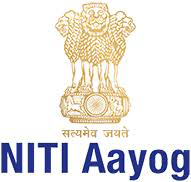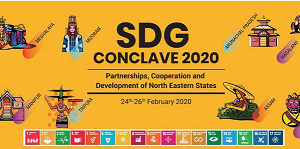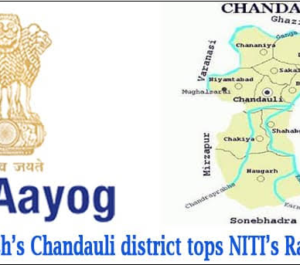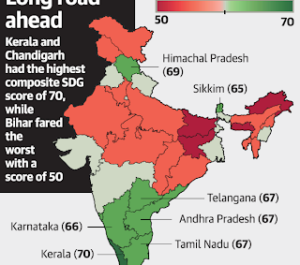Environment and Ecology NITI Aayog proposes decarbonising of industrial emissions NITI Aayog and MN Dastur & Company jointly prepared a report on the policy framework of the CCUS. Carbon Capture Utilisation and Storage (CCUS) is the technology which can be used for decarbonising carbon dioxide (CO2) from high polluting sectors such as steel, cement, oil, gas, petrochemicals, chemicals and fertilisers. It has a critical role to play for the country to halve CO2 emissions by 2050, CCUS technology would help in promoting the low carbon-hydrogen economy and in removal of the CO2 stock from the atmosphere. India needs a sustainable solution for the decarbonisation of sectors that contribute to 70% of emission. CCUS has an important and critical role to play for India to accomplish net-zero by 2070. About NITI Aayog Formation - 1 January 2015 Headquarters - New Delhi Chairperson - Prime Minister Vice Chairperson - Suman Bery The Gold Awardees are: Category I – Excellence in Government Process Re-engineering for Digital Transformation (i) Central level initiatives e-Panchayat Mission Mode Project (eGramSwaraj & Audit Online) Ministry of Panchayati Raj (ii) State/UT level initiatives MINE MITRA Directorate of Geology & Mining, (Uttar Pradesh) Category II – Excellence in Providing Citizen Centric Delivery (i) Central level initiatives Judgement & Orders search Portal (High Courts of India) eCommittee, Supreme Court of India. (ii) State UT level initiatives eRegistration (Self Help Portal) for document registration Department of Registration & Stamps. (Maharashtra). Category III- Excellence in District level initiative in e-Governance (i) North - East States + Hill States Parvarish (A step Towards Kuposhan Mukta Bharat) District Cachar, (Assam). (ii) UTs (including Delhi) GAASH District Srinagar, (Jammu and Kashmir). (iii) Other States Gang Canal Regulation Computerization Project District Sri Ganganagar, (Rajasthan). Category IV- Outstanding research on Citizen Services by Academic/Research Institutions Category IV Video…
Environment and Ecology
Atal Innovation Mission, NITI Aayog & National Informatics Centre (NIC) jointly launches CollabCAD in ATL schools
Atal Innovation Mission, NITI (National Institution for Transforming India) Aayog and National Informatics Centre (NIC) jointly launched CollabCADin ATL (Atal Tinkering Lab) schools. Key Points: AIM:The aim of this initiative is to provide a great platform to students of Atal Tinkering Labs (ATLs) across the country to create and modify 3D (3- Dimension) designs with free flow of creativity and imagination.
Central government constitutes 10-member group headed by NITI Aayog CEO Amitabh kant to fight corona
In order to deal with this coronavirus (COVID-19) epidemic, the central governmenthas constituted a 10-member group under the chairmanship of NITI (National Institution for Transforming India) Aayog CEO (Chief Executive Officer) Amitabh Kant. Key Points: The work of this group will primarily identify issues through 3 groups of stakeholders, then present effective measures to address solutions to the issues related to the formulation of plans for counter-activities related to COVID-19. The 3 groups includes The UN agencies, World Bank, Asian Development Bank (ADB) Civil Society Organisations and development partners Industry associations – CII (Confederation of Indian Industry), FICCI (Federation of Indian Chambers of Commerce and Industry), ASSOCHAM (Associated Chambers of Commerce and Industry of India), NASSCOM (National Association of Software and Service Companies). About NITI Aayog: Headquarters– New Delhi. Chairperson– Narendra Modi. Vice Chairperson– Rajiv Kumar.
NITI Aayog Report: 28% of Aadhaar based payment are going to wrong accounts

The NITI Aayog has released a progress report on National Nutrition Mission (Poshan Abhlyaan). According to the report, one in three Aadhaar based payments was credited to a wrong bank account, especially in Pradhan Mantri Matru Vandana Yojana. Highlights This is the second report prepared by the think tank. The report was prepared and released by the Ministry of Women and Child Development. According to the report, 28% of Aadhaar based payments were going to wrong bank accounts. The report also says that 66% of direct benefit transfers were based on Aadhaar. Only 60% of the beneficiaries were aware of the receipt of benefits.
NITI Aayog organizes North East Sustainable Development Goal Conclave 2020 in Assam

NITI Aayog is to organize North East Sustainable Development Goal Conclave 2020 in Assam between February 24, 2020 and February 26, 2020. The Conclave is to be held in the state capital Guwahati. Chief Ministers of all the north eastern states namely Arunachal Pradesh, Manipur, Nagaland, Manipur, Meghalaya, Assam, Tripura and Sikkim are to participate in the conclave.
NITI Aayog’s Aspirational district ranking : Chandauli of UP tops in December 2019

NITI Aayog (National Institution for Transforming India), a policy think tank of the Government of India (GoI), released the ranking of Aspirational Districts of the country for the month of December 2019. The ranking is based on the progress made in 5 development areas in 112 aspirational districts across India in December 2019. The rankings focus on progress in Health and nutrition, education, agriculture and water resources, financial inclusion& skill development and Basic infrastructure. Top 3 states in Aspirational Districts ranking: S.No. State District Score (December-2019) 1 Uttar Pradesh Chandauli 57.6 2 Odisha Balangir 53.9 3 Andhra Pradesh Y.S.R. 65.2 About NITI Aayog: Formed– 1 January 2015 Headquarters– New Delhi.
Kerala tops NITI Aayog’s index of UN goals

Kerala has retained its top slot, whileUttar Pradesh, Odisha and Sikkim have shown the most improvement. The second SDG-zero hunger –shown sharp divergence in the performance of States, with little middle ground, Kerala, Goa and parts of the north-east, including Mizoram, Nagaland, Arunachal Pradesh and Sikkim, have scored above 65, with Goa at 75 points. 22 of the States and Union Territories have scored below 50, with the central Indian States of Jharkhand, Madhya Pradesh, Bihar and Chhattisgarh scoring below 30, showing high levels of hunger and malnutrition. On the fifth SDG-gender equality – almost all States fare poorly. Only Jammu and Kashmir, Himachal Pradesh and Kerala have managed to cross 50 points, The indicators considered include crimes against women, eradicating sex selection and discrimination against daughters, and access to reproductive health schemes, as well as indicators showing women’s economic and political empowerment and leadership. The Swachh Bharat Mission has contributed largely to the high scores on the sixth SDG-clean water and sanitation – although that was helped by the fact that four out of seven indicators dealt with toilets and sanitation, while only one indicator was related to safe and affordable drinking water. All States and union Territories except for Delhi have scored above 65, with the national capital scoring poorly on the percentage of urban households with individual household toilets (less than 1%) and, oddly, providing no data on districts verified to be open defecation free.

